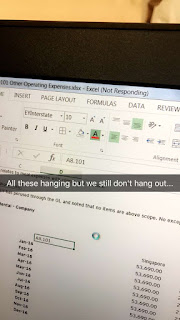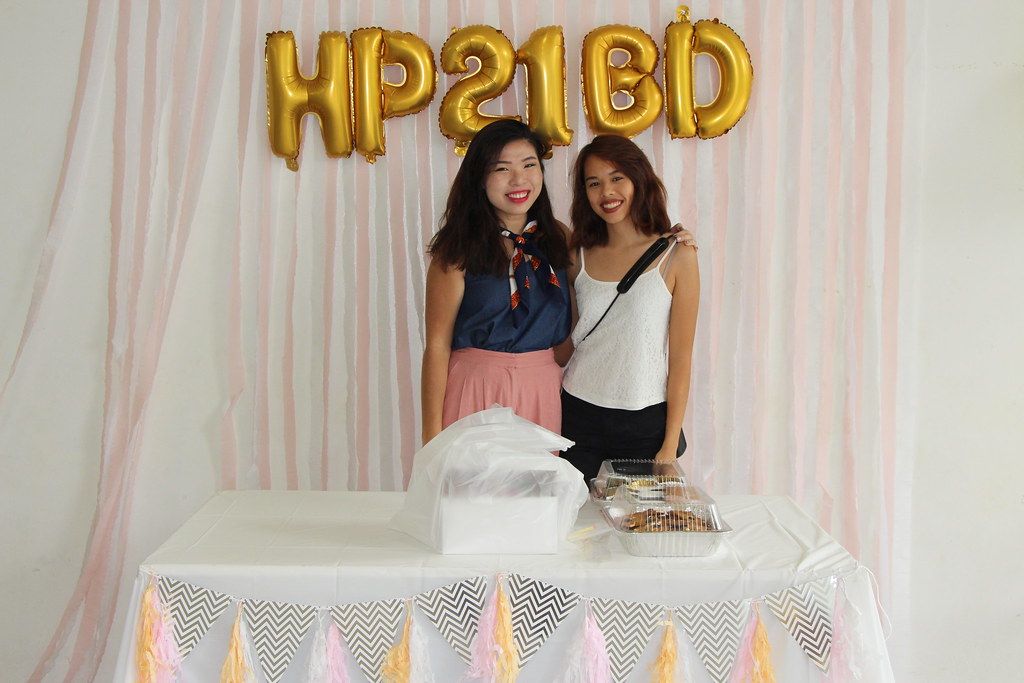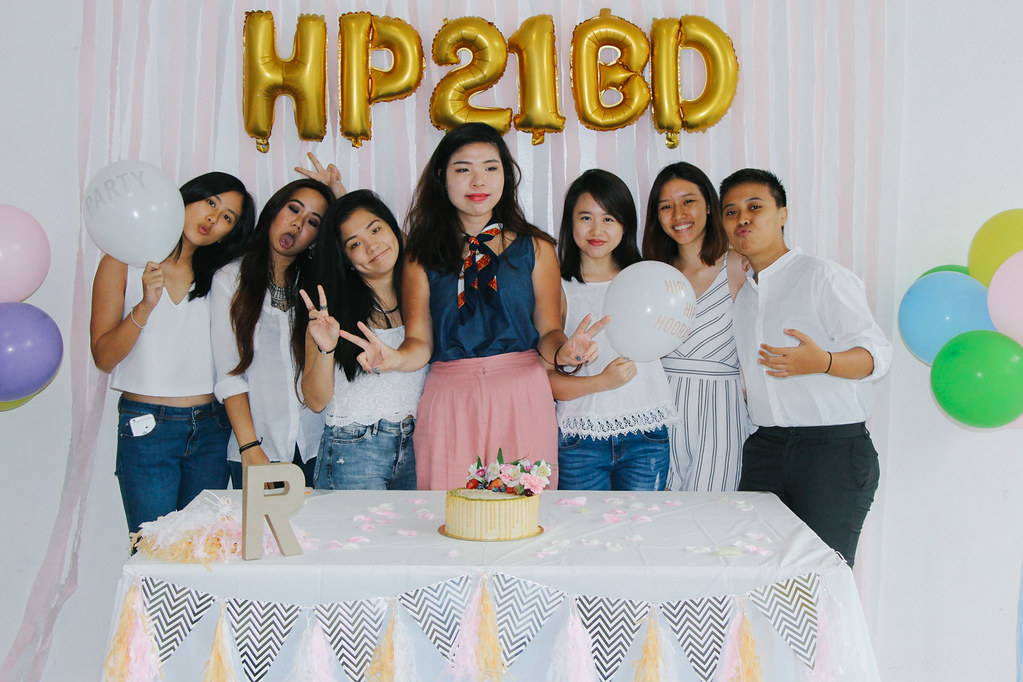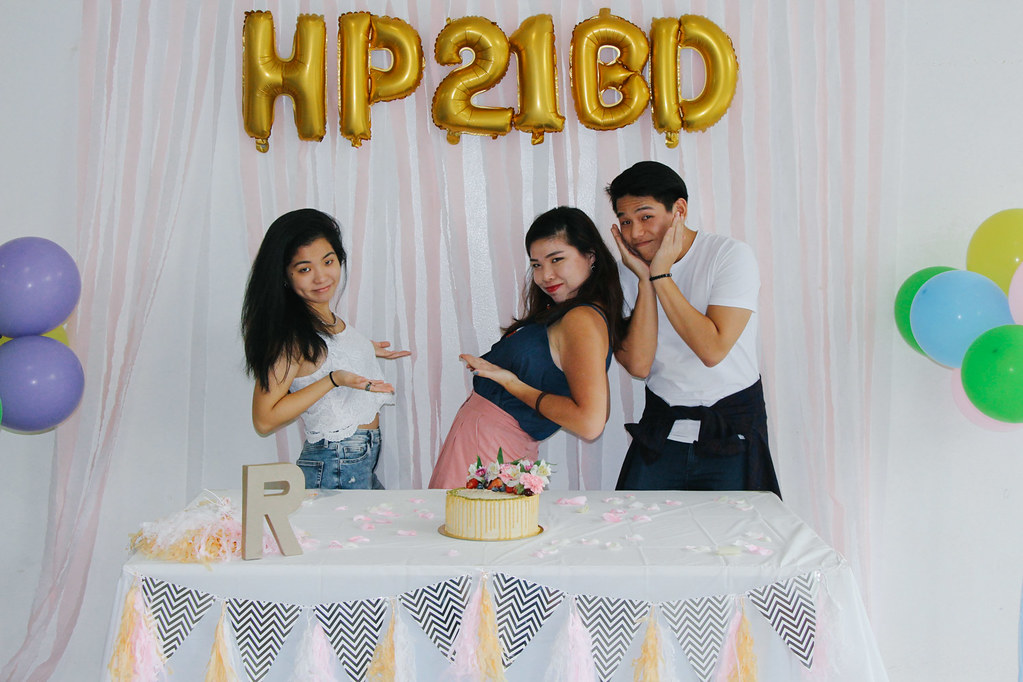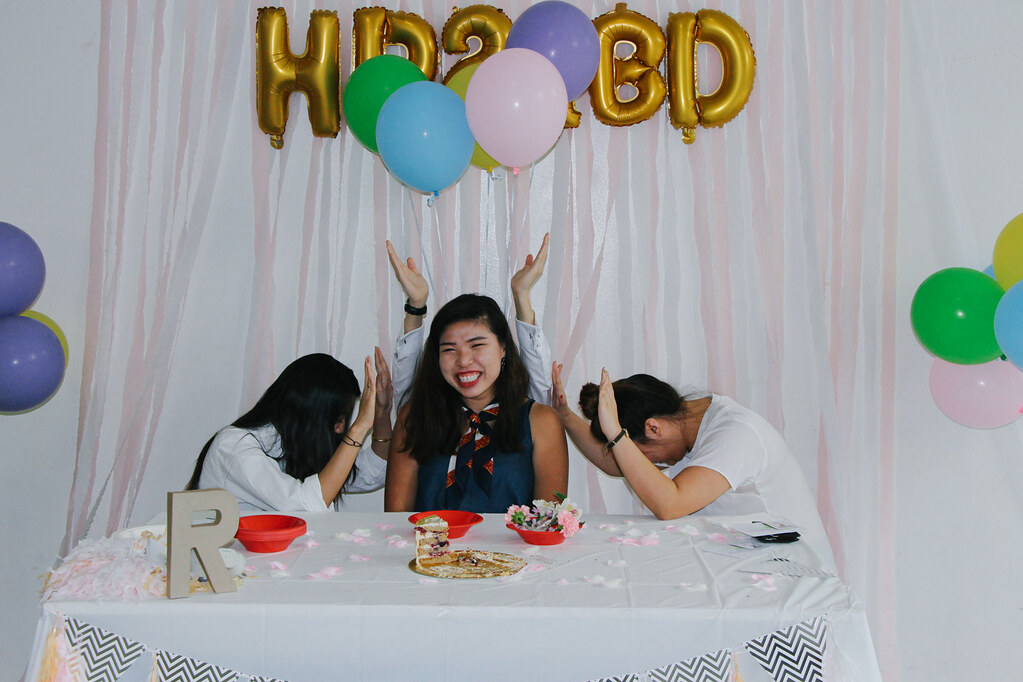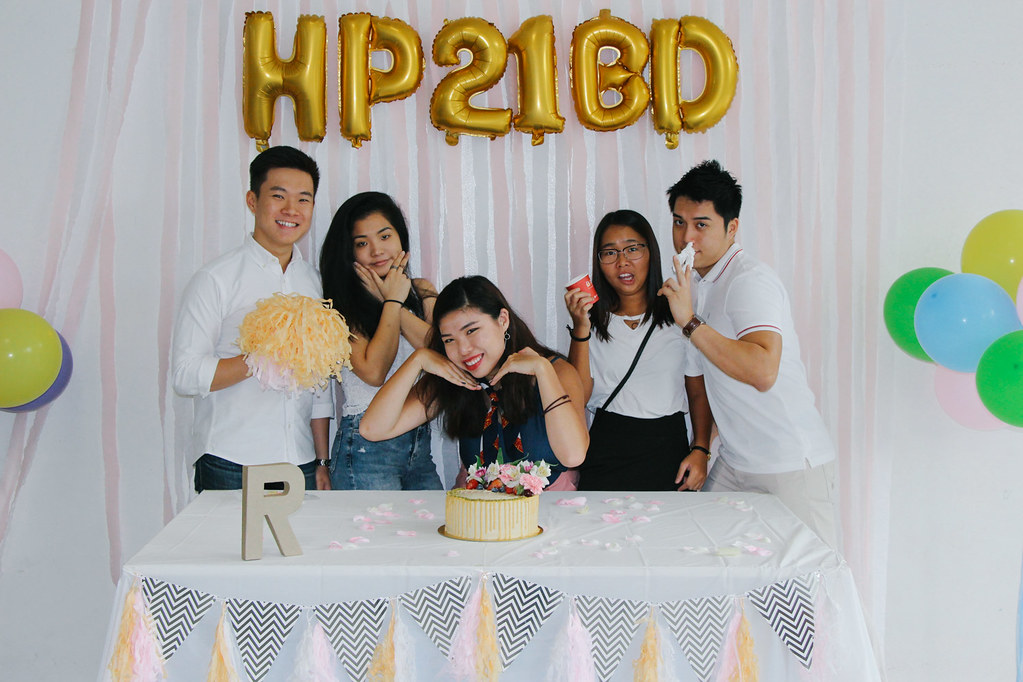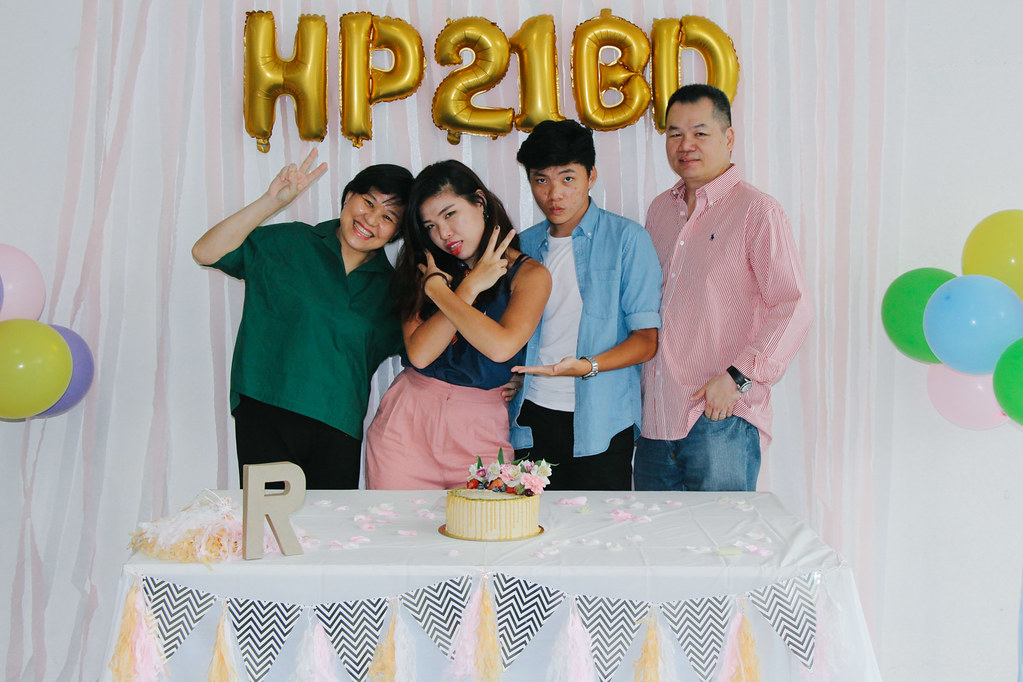So I've come to realise I only ever write whenever I'm faced with a huge pain in the butt, heartbroken or whenever I'm transitioning through different milestones in life. Guess this is me transitioning out of my first full-time job! Yay, maybe I should Facebook milestone this ASAP.
Writing this because it's a useful reminder for myself (and anyone else who reads this space) about the exponential growth that you will face in your twenties, upon graduation and when you enter the workforce with your initial wide-eyed wonder and drive, and then slowly deteriorating and like a car running low on fuel. How I spent my 11 months fighting hard at work and trying to balance all the other wonderful millennial twenty-something problems I have, attempting to find purpose and meaning despite the struggles, and how I eventually learnt to let go (practically) and found another job.
I'll talk about what made me and how I actually got up from my butt and managed to find another job and quit my audit job another time. This post is already getting a bit lengthy but I hope it helps.
I spent 11 months as a full-time auditor in one of the big 4 audit firms and like many others, this became my first job because it was "safe", it was "something related to my field of study" because I graduated with a double major in accounting and finance, and it was honestly the only job offer I had at the point of graduation. Times are hard, man.
3 THINGS TO EXPECT FROM YOUR FIRST JOB:
1. Expect yourself to know nothing
Despite interning with the firm for about 2 months prior to joining full-time, the first few months was a huge learning curve for me. Be ready to learn, have an open mind and be super (i mean super) open to constructive criticism. If your colleagues have a better or more efficient way of working things out, never be afraid to ask them to teach you (and hopefully they'll be willing to share), but never ever think that it's embarrassing to ask "stupid" questions!! This is so important!! Throughout my 11 months I've asked pretty "stupid" questions that miiiighttt have made me look like an audit noob to some of my seniors, but I'm lucky that they're all pretty understanding and just know that a year or two ago, they were in the same shoes as I was. That makes everything seem a whole less awkward.
When I first started out, I knew nothing about excel shortcuts and basic every-day functions like vlookup and how to construct a bloody pivot table. Took me close to about 4 months of everyday excel usage to really familiarise myself with those shortcuts and formulae. It's been about 11 months but it's still safe to say on a scale of 0 being "knowing absolutely nothing" to 10 being "knowing everything", I'm probably just made it to a 1. Or maybe a solid 1.5. We'll get there.
2. Expect lots of struggle and patience (!!) is truly a virtue
What is life without its constant struggle? I read somewhere that life is really all about choosing the things and problems that you would sacrifice yourself for because let's be real, we can never live a pain-free and problem-free life.
During the 11 months doing a nature of work I was not necessarily good at was hard because as much as I tried not to overhype the thought that I will
l o v e my job (just like what every movie, advertisement and instagram post tried to tell me), I couldn't let it go.
Screw you social media and ridiculously inflated expecations!!! I couldn't see it in the right perspective that would make me hustle hard and see the meaning behind the work I was doing. If the work you're doing is boring/meaningless, then you just have to find a way to change your perspective in order to get by and not get too depressed, right? Right.
Having patience with yourself is so important because we always love to set unrealistic expectations for ourselves and it really takes time and effort to try to reach that realistic expectation vs your actual performance and work and realising what are the factors contributing to your performance. It's hard but also very normal to constantly benchmark yourself against others.
I'm still trying to find that right balance in making sure that I'm not lagging behind too much but also trying to be okay with my own pace when I work. It's not always good to compare though I would say a good amount of healthy competition and stress would help propel you in your performance at work.
3. Expect yourself to pick up the shit if things go south
I don't know about you but I was so conditioned to handle problems at work almost the exact way I handled problems I faced in exams/school. It was so difficult trying to seggregate the nature of the two problems, because it was almost natural for me to go into my auto-pilot "how-to-solve-problems-when-in-school" mode.
Whenever I got stuck with a problem in an exam, we were always taught to skip it and move onto the next question. Even training myself to do that was a chore because I was always the kind of kid that refused to move onto the next question until I solved the one I was stuck on. And when the questions got harder as we moved up the educational ladder, I had to train myself to let go and move on. But you know, being students, we always had a lowkey choice as to whether or not we could: a) leave it blank b) give some sub par answer and hopefully try to score some method marks here and there c) wreck your brains out and try your freakin' hardest.
I'm an a or b kind of girl, 100% honest with you. This is also probably why I never got my first class.
Okay, back the point. Because I was so used to being okay with blatantly giving up whenever I hit a hard question or doing bare minimum enough to get me a couple of method marks here and there, this approach was the only approach I was able to come up with when I was faced with problems at work and it was naaahhhtt guuud!!! It was a struggle, man. I literally had to force myself to rewire my thought process and it really trained me not to keep giving up. All I could tell myself was that it was impossible to give up because the responsibility was mine to deliver on my part and no one else was going to pick up the shit unless I did something about it.
Shit doesn't move unless you do because you're the shit. - Rachel Tan, 2017.
3 THINGS NOT TO EXPECT FROM YOUR FIRST JOB:
1. Don't expect to make friends, just colleagues.
Basically, have the most open mind you can possibly have.
Coming back from Melbourne did give me a broader perspective and I was definitely more open to chat and socialise, but the problem is: I went into orientation holding the same expectation that the people there were going to do the same. Maybe I was already conditioned to think that way because many of the Singaporean friends I made in Melbourne all mostly held the same mentality that they're all away from home, so they're more open and willing to put themselves out there to strike up conversations with other people. After a relatively huge culture shock and feeling like a fish out of water throughout my 3D2N orientation program, I went home crying and completely hating everything because I was unable to "make friends" like how I used to back in Melbourne and in school. That was one misconception that I had when I entered into my first job - I expected everyone I met to be friend material where we would have that "instant click" and we'll all be BFFs having brunch and really top notch conversations. But instead, I was swamped with boring questions and lots and lots of work-related talk, "what clients are you on?" "Do you know any seniors?" "What sector are you in?" "I heard xx was a terrible client.." the list goes on.
Ultimately, it was my first job and inevitably due to the flaws of the human mind, we're most likely to enter into a new environment with a set of ideals and expectation. That's no one's fault. And that's honestly really okay, but the lesson learnt is when your expectations and ideals are not being met (high chances that this will happen), you cannot sit down, sulk, get angry at people and the circumstance you were placed in. Instead, get back up on your feet and readjust your perspective on the situation and remember to always try to have an open mind, open heart and listening ears. Back in school, we were given the privilege to choose who we wanted to work with. But at the workplace, you can't possibly choose who you want to work with and who your colleagues are going to be and most importantly, not everyone's going to be your friend. You just have to adapt and adjust to your surroundings and the people around you. This was initially very hard for me to navigate around but I've learnt that humans are social creatures and we are all equipped with relatively strong adaptation skills. Trust in those innate skills and you'll slowly find yourself being able to adjust quickly to new surroundings and different people.
2. Don't expect work-life balance (the way the social media makes it out to be)
Millenial shit. Instagram hypes it up too much and we forget about the daily grind that most of us goes through rather than the 2% of instagrammers with their perfect "hustle-hard-but-still-got-time-to-post-really-sick-flatlays-of-my-new-chanel-bag" posts. However, this really taught me how to prioritize my limited time to do really meaningful things.
During peak I worked non-stop and at a point in time, I was so burnt out from work that I literally spent my weekends sleeping and only headed out for meals with my family.
(hey but at least I still had my shitty humour in tact during peak period yeah.. ;-) )
I learnt that I get energy from spending time with friends and family, where I get re-energized for the week with the conversations and time I have with them. So during the peak period where I couldn't get out of bed and stayed at home all day, I was upset and the work week seemed like it dragged on continuously for 2 weeks. It felt like there wasn't a break so I decided to go out every weekend, whether or not it was to run a lame errand with my family or it was a quick catch up session with a friend. This helped my brain mark the end of a work-week and tell myself it was time to relax, even just for a bit.
3. Don't expect everyone to have the same work ethic as you
This is still pivotal learning issue for me because I understand that different companies uphold different values and cultures. Cultures are mainly defined by the majority of the employees within the company and what they stand for and how they function as a whole. What I've learnt during my time in a large Singapore-based audit firm is that no matter what, somehow this bad mentality of the number of hours I put in at work somehow correlates to how much work is being done, ultimately reflecting whether or not I'm a "hard worker" or a "slacker".
It's probably a generalisation but this is personally what I've experienced throughout my 11 months working and maybe it's a very "Singaporean/kiasu" thing to do. I entered the work with a very Australian-laid-back-super-into-work-life-balance mindset, where I initially stood very firm on not turning on my work laptop at home, getting off from work at 6:30/7pm every day and keeping my weekends very isolated from work things. However, as time went by and evidently many of my colleagues and seniors had very different perspectives on this whole work-life balance thing, they had no qualms working till 1/2am every night and sacrificing weekends slogging out at the office (at least the office has air con on weekends, they say. LOL), it got very hard to stand by my strict work-life balance values.
I've also had people give me judgmental looks when I say that I want to maintain a work-life balance, and others discouraging me from it because it comes across as if I have other things in life that are more important and that in itself was a negative connotation. Looking back, prioritising a life outside work is NOT a negative thing and it's NOT something that appears to be "slacker" or "lazy" because it just goes to show that you prioritise a life outside of work more than the other person and that is OKAY.
What's NOT okay is the bad culture that deems you as "slacker" or "lazy" just because you don't clock in at least 4 hours of overtime and you don't work weekends. Eventually, I caved into the peer pressure and found myself routinely coming home and turning on my laptop to continue with more work and seniors would find it okay to send me emails at 1am, expecting me to read and sometimes respond to them as soon as it gets sent out. That's when I started feeling very depressed, overwhelmed and that work never ends. I no longer had the values I initially once felt so strongly about and that made me feel like I disappointed myself or lost myself in the process.
This was an issue I really struggled with and spoke to a few close friends about, but eventually, the solution to this problem was really asking myself what was important and what I could do to stop feeling negative about work and how to make myself feel better. It took a huge amount of effort to consciously not turn on my laptop once I reached home and dealing with the guilt that ensued from not working when I came home was something that was a tough pickle to deal with. Logically I knew that it wasn't necessary to feel guilty for not working during after-office hours, but irrationally I felt like I was "slacking" or that "other people are still working now, and you're not, this is why you will always suck." !!! SOooooo many people struggle with this in the workplace I was in, but I think what's needed is really not to give a shit about what others might think of you but at the same time be answerable to the quality and quantity of work you've done during office hours.
OKAY!!! I'm done with this long-ass rant and I'm glad I've managed to pen my thoughts down despite it being pretty repetitive! Huge shout out to my best friends, my rock my shelter and everything else in between, and my new friends/colleagues that were the best source of strength and comfort whenever work got too hard, you guys also know who you are. It's been a hell of a ride working at the big 4 and despite it's crazy challenges like the mad working hours with crazy deadlines and sometimes difficult team mates, I have learnt so much and this experience has made me come out stronger than before (ugh cliche, I know).
To the next chapter in life, here I come!




